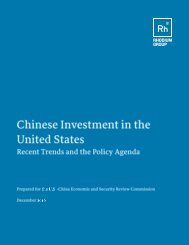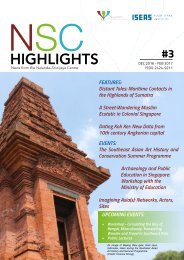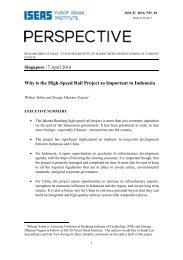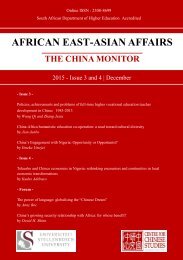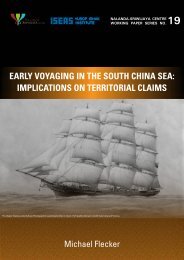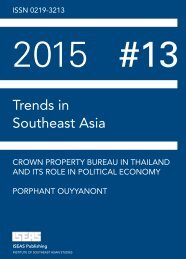You also want an ePaper? Increase the reach of your titles
YUMPU automatically turns print PDFs into web optimized ePapers that Google loves.
Conclusion of <strong>the</strong> Third Congress of <strong>the</strong> Nanyang CP (mean<strong>in</strong>g <strong>the</strong> <strong>in</strong>augural Congress of <strong>the</strong><br />
MCP). A document kept <strong>in</strong> a different file, which w<strong>as</strong> referred to by Anna Belogurova, noted that<br />
<strong>the</strong> third representative conference of <strong>the</strong> NCP w<strong>as</strong> held on 22-23 April. Ano<strong>the</strong>r Com<strong>in</strong>tern<br />
document dated 1 June 1930 noted that <strong>the</strong> <strong>in</strong>augural Conference w<strong>as</strong> convened on 21 May 1930<br />
and suggested that <strong>the</strong> leaders who had been arrested on 29 April did not officially <strong>as</strong>sume <strong>the</strong><br />
MCP’s posts on <strong>the</strong>ir arrests yet. Ho Chi M<strong>in</strong>h who presided at <strong>the</strong> conference recalled <strong>the</strong> meet<strong>in</strong>g<br />
had been held twice. It might be presumed from here that its prelim<strong>in</strong>ary congress seemed to have<br />
been convened on 22-23 April (tentative decisions were made) and <strong>the</strong> official Congress on 21 May<br />
1930.<br />
4. It h<strong>as</strong> been considered that <strong>the</strong> Com<strong>in</strong>tern and Ho Chi M<strong>in</strong>h directed <strong>the</strong> newly formed<br />
MCP to be a more multi-national (multi-ethnic) organization that would attach greater importance<br />
to organiz<strong>in</strong>g Malays and Indians. <strong>The</strong> Com<strong>in</strong>tern documents showed that it had <strong>in</strong>structed <strong>the</strong><br />
MCP to form a unified national party consist<strong>in</strong>g of <strong>the</strong> various <strong>Malayan</strong> nationals (ethnic groups),<br />
<strong>in</strong>clud<strong>in</strong>g Malays, Ch<strong>in</strong>ese, Indians and so on. <strong>The</strong> idea of establish<strong>in</strong>g a “Unity <strong>Party</strong>” compris<strong>in</strong>g<br />
people who each reta<strong>in</strong>ed <strong>the</strong>ir orig<strong>in</strong>al nationality ( 国 籍 ) w<strong>as</strong> rejected. Subsequently, <strong>the</strong><br />
Com<strong>in</strong>tern <strong>in</strong>structed that <strong>the</strong> MCP should subsume all nationals under its organization, and non-<br />
Malays should leave <strong>the</strong> movements of <strong>the</strong>ir orig<strong>in</strong>al countries. Evidently <strong>the</strong> MCP did not<br />
understand this conception which w<strong>as</strong> why <strong>the</strong> Com<strong>in</strong>tern cont<strong>in</strong>ued to criticize <strong>the</strong> MCP for not<br />
sufficiently tak<strong>in</strong>g <strong>the</strong> concrete, practical <strong>Malayan</strong> situation <strong>in</strong>to consideration.<br />
5. After <strong>the</strong> MCP w<strong>as</strong> established <strong>in</strong> 1930, <strong>the</strong> party dispatched several representatives to<br />
Shanghai to report about <strong>the</strong> situation of Malaya and, <strong>in</strong> return, receive <strong>in</strong>structions and funds from<br />
<strong>the</strong> Com<strong>in</strong>tern’s FEB through <strong>the</strong> CCP. Here, Ho Chi M<strong>in</strong>h appeared to have played <strong>the</strong> role of a<br />
mediator while he lived <strong>in</strong> Shanghai and Hong Kong. But, due to <strong>the</strong> strict vigilance of <strong>the</strong> colonial<br />
authorities, it w<strong>as</strong> difficult for <strong>the</strong> MCP representatives to contact <strong>the</strong> CCP, let alone <strong>the</strong> FEB.<br />
Because of this, <strong>the</strong> MCP time and aga<strong>in</strong> requested <strong>the</strong> Com<strong>in</strong>tern to directly dispatch its<br />
representatives to Malaya to guide <strong>the</strong> movement. Thus Ducroux and his group of <strong>the</strong> FEB were<br />
sent to S<strong>in</strong>gapore <strong>in</strong> 1931. So far, it w<strong>as</strong> only argued that because <strong>the</strong> Com<strong>in</strong>tern wanted to lead <strong>the</strong><br />
MCP without <strong>in</strong>tervention by <strong>the</strong> CCP. But actually it w<strong>as</strong> realized not due to unilateral <strong>in</strong>terests of<br />
<strong>the</strong> Com<strong>in</strong>tern but due to bilateral ones with <strong>the</strong> MCP.<br />
With <strong>the</strong> arrest of <strong>the</strong> Ducroux group <strong>in</strong> S<strong>in</strong>gapore <strong>in</strong> June 1931, <strong>the</strong> FEB personnel were<br />
likewise arrested and <strong>the</strong> FEB’s network w<strong>as</strong> completely elim<strong>in</strong>ated. That restricted MCP’s<br />
129



